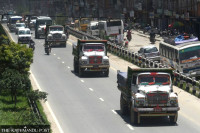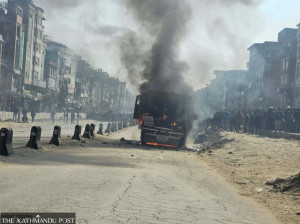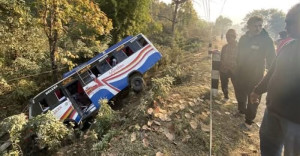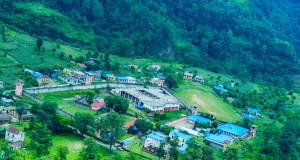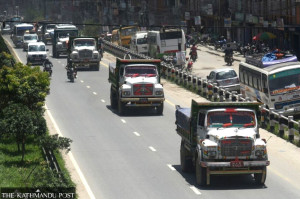The Chitwan Expo Centre in Bharatpur is being converted into a temporary treatment facility for people suffering from suspected coronavirus infection.
A meeting called by Bharatpur Metropolitan City on Tuesday decided to set up the facility within 72 hours. The treatment centre will have a 10-bed intensive care unit, a 10-bed high dependence unit, and a 50-bed general ward.
“The meeting of stakeholders decided to set up the treatment centre keeping in view of the possible outbreak of the novel coronavirus. The Chitwan Expo Centre is a suitable place for the centre,” said Bharatpur Mayor Renu Dahal.
The meeting also formed the Coronavirus Infection, Prevention, Control and Preparedness Committee and a task force to operate the treatment facility.
The preparedness committee, led by Dahal, has already started works to gather tools and equipment for the facility.
As countries around the world are struggling to contain the Covid-19 pandemic caused by the novel coronavirus, authorities and medical facilities in Nepal have been slow to respond. Although the country has recorded only one confirmed case of coronavirus, people from various quarters have been urging the authorities concerned to immediately set up preventive measures.
It was only a week earlier that the district administration instructed all major hospitals to establish isolation wards to treat suspected Covid-19. So far, only Bharatpur Hospital has complied with the order.
Liladhar Paudel, information officer at the hospital, said the hospital had initially set up a five-bed isolation ward which was recently expanded into a 19-bed unit.
The hospital has already treated four suspected cases in its isolation ward.
“The throat and nasal swabs of the four patients were collected and sent to the central laboratory in Kathmandu for Covid-19 confirmatory tests. All test results came negative,” Paudel said.
The local administration has asked Bhatarpur Medical College and Purano Medical College to establish isolation wards with at least 20-bed capacity. But they are yet to set up the facilities.
Frequently asked questions about the coronavirus outbreak
UPDATED as of September 22, 2020
What is Covid-19?
Covid-19, short for coronavirus disease, is an illness caused by the coronavirus SARS-CoV-2, short for severe acute respiratory syndrome coronavirus 2. Common symptoms of the disease include fever, dry cough, fatigue, shortness of breath and breathing difficulties. In severe cases, the infection can cause pneumonia, severe acute respiratory syndrome, kidney failure and even death.
How contagious is Covid-19?
Covid-19 can spread easily from person to person, especially in enclosed spaces. The virus can travel through the air in respiratory droplets produced when a sick person breathes, talks, coughs or sneezes. As the virus can also survive on plastic and steel surfaces for up to 72 hours and on cardboard for up to 24 hours, any contact with such surfaces can also spread the virus. Symptoms take between two to 14 days to appear, during which time the carrier is believed to be contagious.
Where did the virus come from?
The virus was first identified in Wuhan, China in late December. The coronavirus is a large family of viruses that is responsible for everything from the common cold to Middle East Respiratory Syndrome (MERS) and Severe Acute Respiratory Syndrome (SARS). After an initial outbreak in Wuhan that spread across Hubei province, eventually infecting over 80,000 and killing more than 3,000, new infection rates in mainland China have dropped. However, the disease has since spread across the world at an alarming rate.
What is the current status of Covid-19?
The World Health Organisation has called the ongoing outbreak a “pandemic” and urged countries across the world to take precautionary measures. Covid-19 has spread to 213 countries and territories around the world and infected more than 31,405,983 people with 967,505 deaths and 22,990,260 recoveries. In South Asia, India has reported the highest number of infections at 5,557,573 with 88,943 deaths. While Pakistan has reported 306,304 confirmed cases with 6,420 deaths. Nepal has so far reported 65,276 cases with 427 deaths.
How dangerous is the disease?
The mortality rate for Covid-19 is estimated to be 3.6 percent, but new studies have put the rate slightly higher at 5.7 percent. Although Covid-19 is not too dangerous to young healthy people, older individuals and those with immune-compromised systems are at greater risk of death. People with chronic medical conditions like heart disease, diabetes and lung disease, or those who’ve recently undergone serious medical procedures, are also at risk.
How do I keep myself safe?
The WHO advises that the most important thing you can do is wash your hands frequently with soap and water for at least 20 seconds or use hand sanitizers with at least 60 percent alcohol content. Avoid touching your eyes, nose and mouth with unclean hands. Clean and disinfect frequently used surfaces like your computers and phones. Avoid large crowds of people. Seek medical attention if symptoms persist for longer than a few days.
Is it time to panic?
No. The government has imposed a lockdown to limit the spread of the virus. There is no need to begin stockpiling food, cooking gas or hand sanitizers. However, it is always prudent to take sensible precautions like the ones identified above.
-by-ramesh-kumar-paudel.jpg&w=900&height=601)




 14.24°C Kathmandu
14.24°C Kathmandu1.jpg)
